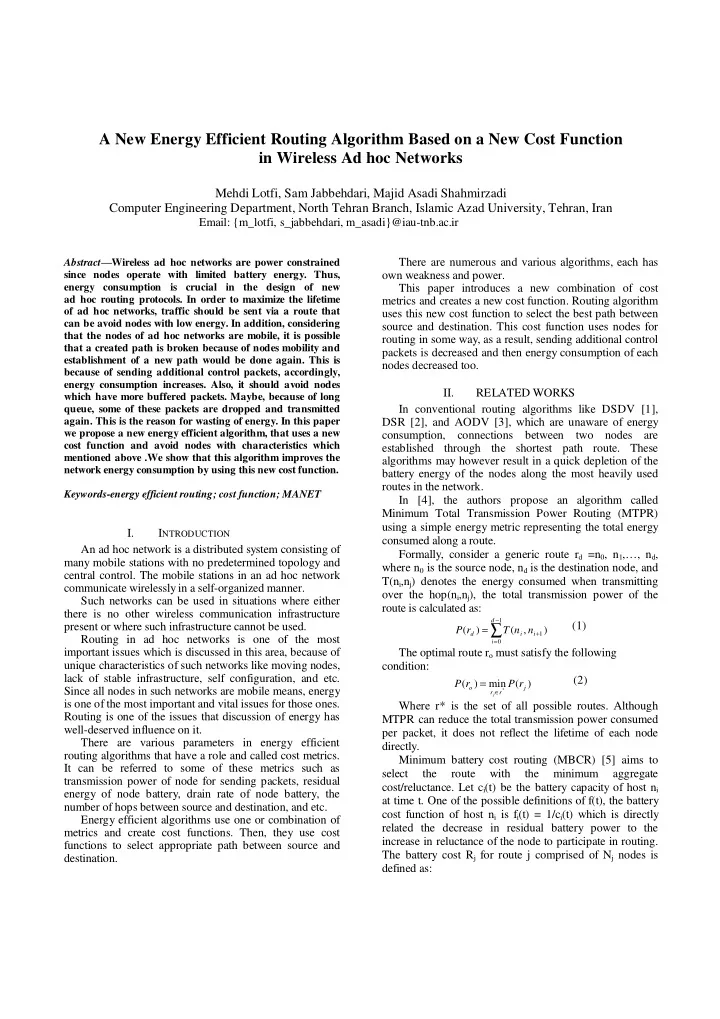

A New Energy Efficient Routing Algorithm Based on a New Cost Function in Wireless Ad hoc Networks Mehdi Lotfi, Sam Jabbehdari, Majid Asadi Shahmirzadi Computer Engineering Department, North Tehran Branch, Islamic Azad University, Tehran, Iran Email: {m_lotfi, s_jabbehdari, m_asadi}@iau-tnb.ac.ir Abstract — Wireless ad hoc networks are power constrained There are numerous and various algorithms, each has since nodes operate with limited battery energy. Thus, own weakness and power. energy consumption is crucial in the design of new This paper introduces a new combination of cost ad hoc routing protocols. In order to maximize the lifetime metrics and creates a new cost function. Routing algorithm of ad hoc networks, traffic should be sent via a route that uses this new cost function to select the best path between can be avoid nodes with low energy. In addition, considering source and destination. This cost function uses nodes for that the nodes of ad hoc networks are mobile, it is possible routing in some way, as a result, sending additional control that a created path is broken because of nodes mobility and packets is decreased and then energy consumption of each establishment of a new path would be done again. This is nodes decreased too. because of sending additional control packets, accordingly, energy consumption increases. Also, it should avoid nodes II. RELATED WORKS which have more buffered packets. Maybe, because of long queue, some of these packets are dropped and transmitted In conventional routing algorithms like DSDV [1], again. This is the reason for wasting of energy. In this paper DSR [2], and AODV [3], which are unaware of energy we propose a new energy efficient algorithm, that uses a new consumption, connections between two nodes are cost function and avoid nodes with characteristics which established through the shortest path route. These mentioned above .We show that this algorithm improves the algorithms may however result in a quick depletion of the network energy consumption by using this new cost function. battery energy of the nodes along the most heavily used routes in the network. Keywords-energy efficient routing; cost function; MANET In [4], the authors propose an algorithm called Minimum Total Transmission Power Routing (MTPR) using a simple energy metric representing the total energy I. I NTRODUCTION consumed along a route. An ad hoc network is a distributed system consisting of Formally, consider a generic route r d =n 0 , n 1 ,…, n d , many mobile stations with no predetermined topology and where n 0 is the source node, n d is the destination node, and central control. The mobile stations in an ad hoc network T(n i ,n j ) denotes the energy consumed when transmitting communicate wirelessly in a self-organized manner. over the hop(n i ,n j ), the total transmission power of the Such networks can be used in situations where either route is calculated as: there is no other wireless communication infrastructure − d 1 ∑ (1) present or where such infrastructure cannot be used. = P ( r ) T ( n , n 1 ) + d i i Routing in ad hoc networks is one of the most = i 0 important issues which is discussed in this area, because of The optimal route r o must satisfy the following unique characteristics of such networks like moving nodes, condition: lack of stable infrastructure, self configuration, and etc. = (2) P ( r ) min P ( r ) o j Since all nodes in such networks are mobile means, energy j ∈ * r r is one of the most important and vital issues for those ones. Where r* is the set of all possible routes. Although Routing is one of the issues that discussion of energy has MTPR can reduce the total transmission power consumed well-deserved influence on it. per packet, it does not reflect the lifetime of each node There are various parameters in energy efficient directly. routing algorithms that have a role and called cost metrics. Minimum battery cost routing (MBCR) [5] aims to It can be referred to some of these metrics such as select the route with the minimum aggregate transmission power of node for sending packets, residual cost/reluctance. Let c i (t) be the battery capacity of host n i energy of node battery, drain rate of node battery, the at time t. One of the possible definitions of f(t), the battery number of hops between source and destination, and etc. cost function of host n i is f i (t) = 1/c i (t) which is directly Energy efficient algorithms use one or combination of related the decrease in residual battery power to the metrics and create cost functions. Then, they use cost increase in reluctance of the node to participate in routing. functions to select appropriate path between source and The battery cost R j for route j comprised of N j nodes is destination. defined as:
Recommend
More recommend